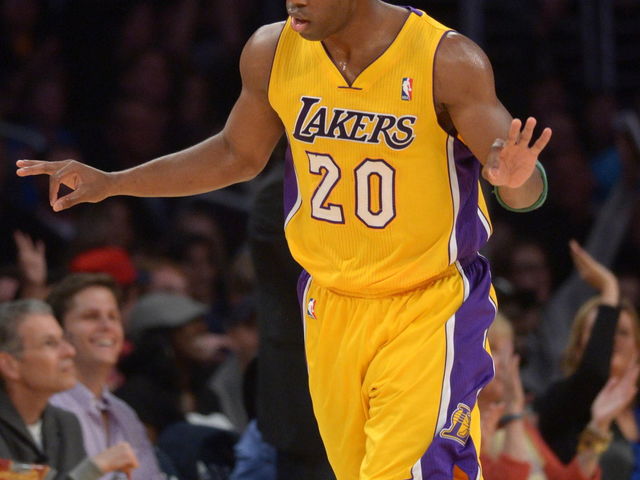Which teams have overpaid for shooting early in free agency?

The NBA off-season and free agency aren't just about marquee franchises chasing superstars. For the majority of teams, the summer is about addressing team needs.
And no basic need is more often sought after or overpaid for than shooting, especially in today's three-point heavy Association. If you needed a reminder about this, a few of the deals agreed to on the first couple days of 2014 free agency should suffice.
In Detroit, Stan Van Gundy's first opportunity to handle free agency as an executive resulted in an agreement on a three-year, $19 million contract with Jodie Meeks (and a reported one-year deal with Cartier Martin).
The 26-year-old Meeks averaged 15.7 points, 2.5 rebounds, 1.8 assists and 1.4 steals while shooting over 40 percent from deep for the Lakers in 2013-14, and I listed the durable guard as an under the radar free agent who could make a difference a short while ago. But it's important to note that Meeks posted those numbers in Mike D'Antoni's up-tempo system in L.A., and history is littered with examples of players who can't match their production in a post-D'Antoni world.
More than half of Meeks' career field goal attempts have come from beyond the arc, which obviously appeals to Stan Van Gundy's preferred style of play if you recall his Magic tenure, and Meeks is a career 37.6 percent three-point shooter, but paying him over $6 million per year kind of defeats the under-the-radar purpose.
When news first broke Tuesday that the Pacers had reportedly agreed to a $2 million per year deal with free agent C.J. Miles, it seemed as though Indiana better understood the value of such players while Miles missed out on an opportunity for more dough.
Well on Wednesday it emerged that the Pacers and Miles had actually agreed to a four-year, $18 million contract. Miles averaged 2.0 rebounds and 1.0 assists in addition to his 9.9 points in over 19 minutes per game with the Cavs in 2013-14, but he shot threes at a 39 percent clip a year after shooting them at a 38 percent success rate, so he has proven himself a capable shooter recently.
The thing is, for a guard, Miles doesn't provide much else, as he's one of just six guards over the last two years to attempt more than eight field goals per game while posting an assist percentage (percentage of teammate field goals a player assisted on while on the court) below 10.0. The other five? Meeks, Kevin Martin, Marcus Thornton, Nick Young and Avery Bradley, who himself on Wednesday agreed to a lucrative four-year, $32 million contract with the Celtics.
Miles should provide dependable shooting for Indiana (although he's only shot above 35% from deep in four of his nine NBA seasons), but will he provide $4.5 million worth of on-court value in each of the next four seasons? It's doubtful.
And then there's the Magic, who have reportedly agreed to a two-year, $9 million deal with Ben Gordon. If there's an argument to be made for Miles being worth $4.5 million per year, it would be that Gordon got the same annual average value while being a lesser player at this point in his career.
Orlando was another poor shooting team in 2013-14, and Gordon is a career 40 percent three-point shooter on over four attempts per game in his 10-year NBA career. The problem, however, is that Gordon played only 19 games in 2013-14, shot 34 percent from the field and 27 percent from deep, posted a Player Efficiency Rating of 6.4, turned 31-years-old and hasn't been an even average quality NBA-er in about three or four years.
In the Magic's case, they were apparently so starved for shooting and so desperate to spend money on a veteran that they're banking on Ben Gordon's career numbers despite stunning displays of decline in his shooting this past season and disturbing displays of decline in his overall game over the last five years.
The Pistons finished 29th in three-point percentage and 22nd in attempts, the Pacers finished 17th in percentage and 25th in attempts, and the Magic finished tied for 19th in percentage and 21st in attempts. It's understandable why these teams feel a need to put a premium on shooting this summer given how important the three-point shot has become in modern day basketball, but with so many more players at various positions now able to step out behind the perimeter, it should also mean that teams shouldn't be overpaying for shooters who can't do much else.
In new contracts for Jodie Meeks, C.J. Miles and Ben Gordon, it doesn't appear the Pistons, Pacers and Magic have grasped that yet.
HEADLINES
- Simmons: Door isn't 'necessarily closed' on Falcons return
- Top Shelf: How will playoffs impact Marner's future? Can Matthews catch Ovi?
- Mariners' Robles out at least 12 weeks with fractured shoulder
- Skubal extends Tigers' winning streak to 5 with victory over Yankees
- Gretzky says he has 'no political power' over president or prime minister